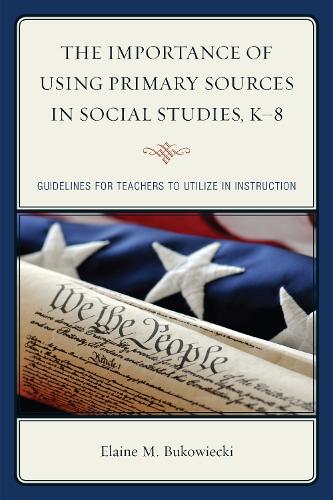
The Importance of Using Primary Sources in Social Studies, K-8: Guidelines for Teachers to Utilize in Instruction
(Paperback)
Publishing Details
The Importance of Using Primary Sources in Social Studies, K-8: Guidelines for Teachers to Utilize in Instruction
By (Author) Elaine M. Bukowiecki
Bloomsbury Publishing PLC
Rowman & Littlefield Education
12th March 2014
United States
Classifications
Professional and Scholarly
Non Fiction
Educational: Citizenship and social education
372.89
Physical Properties
Paperback
254
Width 160mm, Height 228mm, Spine 18mm
386g
Description
This two-part book provides teachers in kindergarten through grade eight with a valuable resource as how to include primary sources in a social studies curriculum along with a required social studies textbook. The first section of this book contains descriptions with relevant examples of primary documents and authentic artifacts that are appropriate for incorporation into social studies classrooms. In the second part of this book, the application of primary sources for specific social studies instruction is presented. This book specifically presents ways to use primary sources as means to explore the community where the students reside, to make connections to past and present events, and to research a specific change agent in a particular place.
Each chapter contains:
questions and pedagogical strategies for criticallly reading, viewing, and responding to varied authentic artifacts; techniques for interacting with primary materials; modifications to meet the needs of diverse learners; assessment techniques; information tied to technology and the new literacies; and connections to the National Curriculum Standards for the Social Studies (2010) and the Common Core State Standards (2010).
Reviews
The author has done a very nice job of writing in a practitioner voice, yet she has grounded the text in research. A very nice balance. -- Cheryl Mason Bolick, associate professor, University of North Carolina at Chapel Hill
In my opinion, the author has done a good job in developing the conceptual framework. It is logical and makes sense in terms of current trends and research in the field. It focuses squarely on an approach to teaching and celebrates that approach throughout the manuscript. -- Dr. Christopher S. Boe, associate professor and director of graduate programs in teacher education, Pfeiffer University
The conceptual approach captures an inclusive perspective of how to teach and articulate social studies through a variety of mediums. By recognizing the vast number of social influences on human activities and events, the author raises awareness of how intimately we are all connected through books, media, and other forms of experience transmission. -- Richard K. Gordon, professor of teacher education, California State University, Dominquez Hills
Author Bio
Dr. Elaine M. Bukowiecki is a professor of literary education at Bridgewater State University in Bridgewater, Massachusetts, where she coordinates the Graduate Programs in Reading. Elaine is a former Massachusetts elementary-school classroom teacher and a Connecticut district-wide language arts coordinator.
